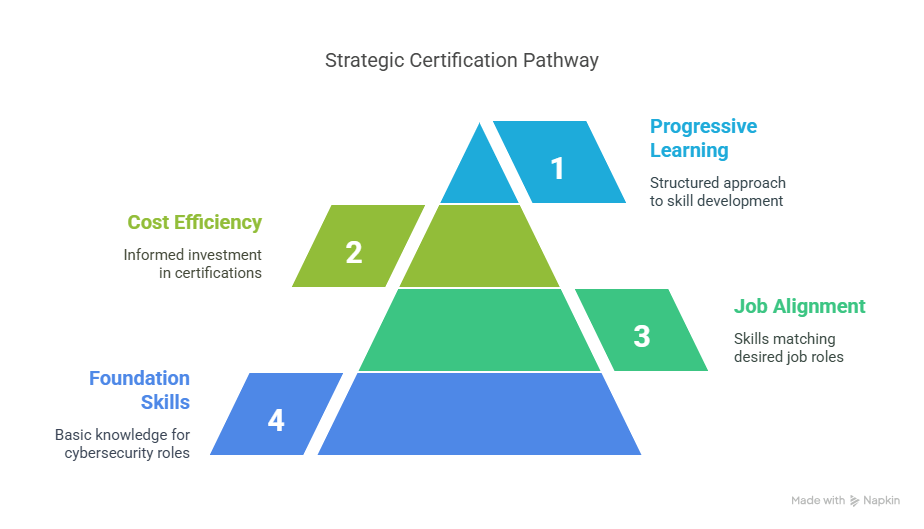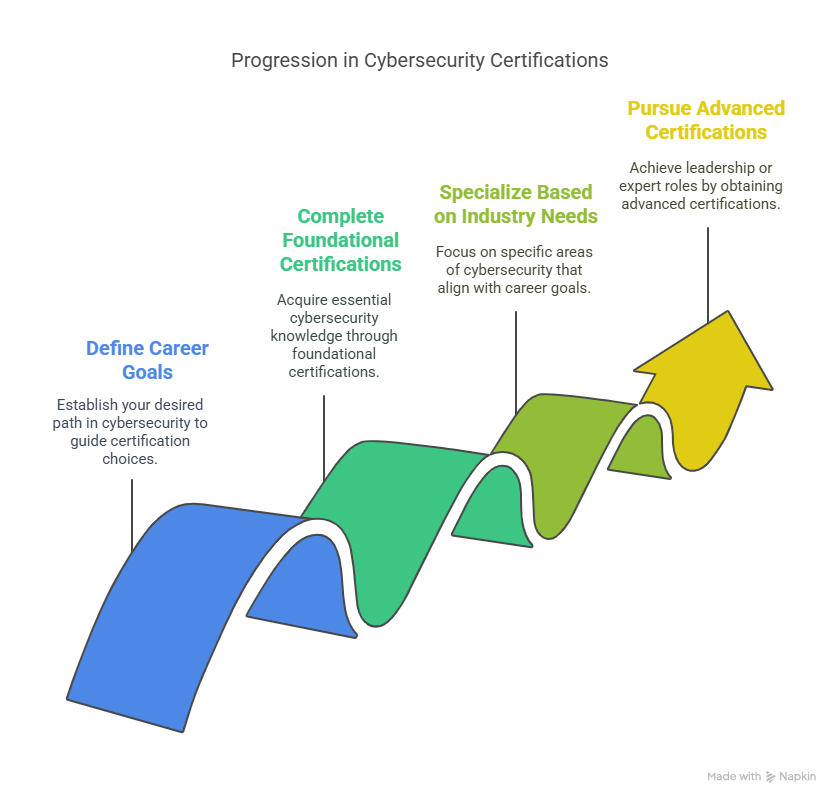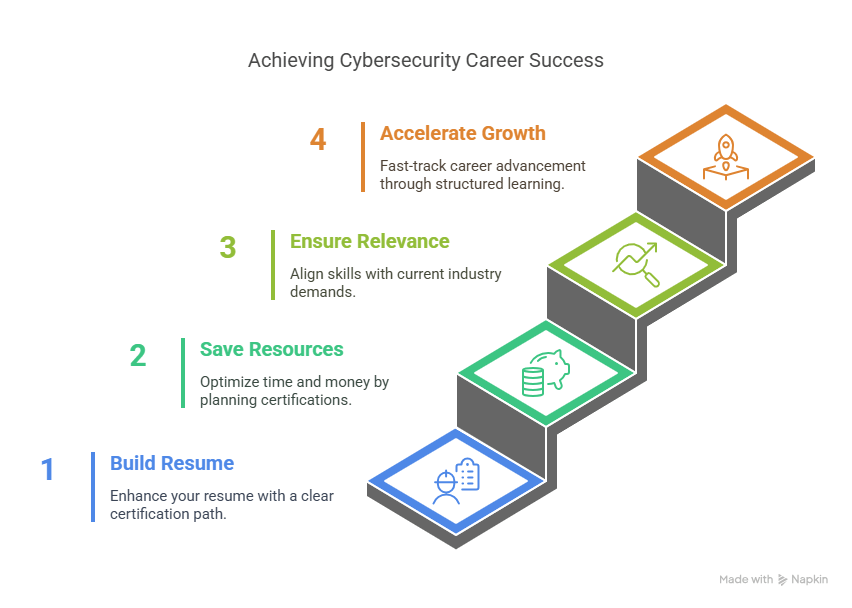Table of Contents
In the fast-paced world of cybersecurity, choosing the right certification order can dramatically impact your career trajectory. With the increasing demand for cybersecurity professionals, certifications—especially the Cybersecurity Certification Test—have become essential for standing out in this competitive field. However, with so many available certifications, it can be overwhelming to determine the best path forward. The order in which you pursue these certifications matters just as much as which ones you choose, as it ensures you acquire the necessary skills and knowledge step-by-step. A well-thought-out cybersecurity certification order can help you stay on track with your career goals, making sure that every certification you earn builds on the previous one.
Why It’s Crucial to Strategize Your Cybersecurity Certification Order
The cybersecurity industry is vast, with various roles such as penetration testers, compliance officers, and network security experts. Each role requires a different set of skills and certifications. Planning your certification order prevents you from wasting time and money, ensuring that every course you take leads to meaningful professional development. Here’s why strategizing your certification order is essential:

1. Better Job Alignment
The right order of certifications ensures that the skills you develop match the job roles you aspire to. Without a structured approach, you may acquire skills irrelevant to your career interests, slowing your progress. A strategic plan aligns your certifications with industry demands, boosting your job prospects.
2. Cost Efficiency
Cybersecurity certifications can be expensive. Pursuing them without a clear roadmap might result in unnecessary expenditures. By planning your certification order, you can pursue certifications that offer the most value, ensuring you make an informed investment in your career.
3. Progressive Learning
Many certifications require prerequisite knowledge or skills. Pursuing certifications in the wrong order could leave gaps in your knowledge. A well-planned certification path ensures you build a solid foundation of basic concepts before advancing to specialized topics, giving you a stronger grasp on complex subjects.
By strategically planning your certification order, you create a coherent and efficient learning journey, paving the way for future success.
How to Determine the Perfect Cybersecurity Certification Order
Determining the right order for your certifications depends on several factors, including your career goals, the skills required for specific roles, and the industry's demand. Here’s how to choose the best path for your certification journey:

Step 1. Define Your Career Goals
Understanding your desired career path in cybersecurity is the first step to determining the right certification order. Whether you aim to be an ethical hacker, cloud security engineer, or compliance manager, your goal will dictate which certifications to pursue first. The path you take depends on your professional aspirations, as each role in cybersecurity has its own set of required skills.
-
Entry-Level Certifications: If you're starting from scratch, foundational certifications like CompTIA Security+ are essential. They offer broad knowledge that lays the groundwork for more specialized certifications later.
-
Mid-Level Certifications: For those already familiar with cybersecurity basics, mid-level certifications like OSCP or CEH will help you specialize in areas like penetration testing or network security.
-
Advanced-Level Certifications: If you aspire to leadership positions or managerial roles, certifications like CISSP or CISM are ideal. They focus on higher-level topics like risk management and security policy development.
Each certification builds upon the last, so defining your career path first ensures that you pursue the right certifications in the right order.
Step 2. Complete Foundational Certifications First
Start your cybersecurity certification journey with foundational certifications that provide a broad understanding of key cybersecurity concepts. These certifications cover basic skills and prepare you for more advanced topics in the future.
-
CompTIA Security+: This is one of the most recommended starting points for anyone entering cybersecurity. It covers essential topics like network security, threat management, and system protections.
-
CompTIA Network+: If you're interested in understanding how networks function and are secured, CompTIA Network+ is a great choice. It focuses on networking protocols, configurations, and vulnerabilities.
Both certifications establish a broad base of knowledge, providing the groundwork needed to dive into more specific cybersecurity areas.
Step 3. Specialize Based on Industry Needs
Once you've acquired a solid foundation, the next step is to specialize in a particular area of cybersecurity that aligns with your career goals. Specialization allows you to focus on the unique challenges and solutions that your chosen niche requires.
-
Ethical Hacking: If you're passionate about penetration testing, the Certified Ethical Hacker (CEH) certification is an excellent starting point. Afterward, consider advancing your skills with Offensive Security Certified Professional (OSCP).
-
Cloud Security: With cloud adoption on the rise, certifications like Certified Cloud Security Professional (CCSP) are ideal if you want to specialize in securing cloud environments.
-
Compliance and Governance: If your focus is on ensuring organizations comply with cybersecurity standards and regulations, certifications like CISSP or Certified Information Security Manager (CISM) will be beneficial.
Specializing early on ensures you develop deep expertise in areas that are in high demand, positioning you for specialized roles in the cybersecurity industry.
Step 4. Pursue Advanced Certifications
Once you've built core expertise, pursuing advanced certifications further solidifies your credentials and sets you up for leadership or highly specialized roles. Advanced certifications provide more in-depth knowledge and demonstrate that you're an expert in your field.
-
OSEE (Offensive Security Exploitation Expert): If you're an experienced penetration tester or want to specialize in exploit development, this certification offers advanced penetration testing techniques.
-
CISA (Certified Information Systems Auditor): For professionals focused on auditing, CISA provides the expertise needed to audit and manage IT systems in compliance with industry standards.
Advanced certifications help position you as a senior or expert professional, increasing your earning potential and career opportunities.
Benefits of Structuring Your Certification Order
A well-structured certification pathway does more than just streamline your learning process—it lays the foundation for long-term career success. Here are the top benefits of a structured approach to your It Specialist Cybersecurity Certification order:

1. Builds a Stronger Resume
Recruiters and hiring managers value candidates with a clear and logical progression of certifications. A well-organized certification order, from foundational certifications like CompTIA Security+ to specialized ones like OSCP or CISSP, shows employers that you’ve taken a thoughtful approach to your professional development. This not only strengthens your resume but also increases your chances of landing interviews.
2. Saves Time and Money
Pursuing certifications without a clear plan can result in unnecessary expenses. By structuring your certification order, you ensure that each certification builds on the last, making your learning process more efficient. Investing in certifications that are directly aligned with your career goals prevents you from spending money on certifications that don’t add value.
3. Ensures Immediate Industry Relevance
A structured certification order guarantees that your skills are always aligned with industry demands. Whether you’re entering the field as a penetration tester or progressing to cloud security, a step-by-step learning approach ensures that you’re equipped to handle the most relevant and current cybersecurity challenges, making you immediately job-ready once certified.
4. Accelerates Career Growth
A structured certification pathway doesn’t just enhance your knowledge—it accelerates your career growth. As you move from one certification to the next, you’re not only learning new skills but also positioning yourself for higher-paying, leadership, or specialized roles. With each certification, you’re building on the last, advancing quickly in your career while making yourself more marketable to employers.
ACSMI Certification with 400+ Modules
ACSMI offers a comprehensive learning platform that supports the cybersecurity certification journey. With over 400 specialized modules, ACSMI covers a wide array of cybersecurity topics, from ethical hacking to AI security. These modules align with industry-leading certifications and provide hands-on labs that mirror real-world cybersecurity challenges. ACSMI’s training helps bridge the gap between theory and practice, ensuring that candidates not only pass their certification exams but also gain practical skills that can be immediately applied in their careers.
ACSMI’s modular approach allows you to specialize in areas like cloud security, forensics, and threat intelligence, ensuring that you can tailor your learning journey to meet your career goals.
Final Thoughts
Choosing the right cybersecurity certification order is not just about collecting credentials; it’s about aligning your certifications with your career goals. By starting with foundational certifications and progressing to more specialized or advanced options, you set yourself up for success in this fast-evolving field. Platforms like ACSMI offer tailored learning experiences, giving you the tools you need to succeed.
Plan your certification journey wisely and take the next step toward becoming a cybersecurity expert in 2025.
FAQs About Cybersecurity Certification Order
1. What is the best certification for beginners in cybersecurity?
CompTIA Security+ is widely regarded as the best starting point for anyone new to cybersecurity. It covers the fundamentals of information security, network security, and threat management, making it ideal for beginners.
2. Should I complete multiple certifications simultaneously?
While it’s possible, it’s best to focus on one certification at a time. Completing one certification thoroughly ensures a strong understanding of the subject, which is essential before moving on to more advanced topics.
3. Are certifications more important than hands-on experience?
Both certifications and hands-on experience are crucial. Certifications validate your theoretical knowledge, while hands-on experience demonstrates your ability to apply that knowledge in real-world scenarios. Platforms like ACSMI bridge the gap by providing both theoretical knowledge and practical training through lab-based learning.
4. How do I prioritize certifications if my ultimate goal is cloud security?
Start with foundational certifications like CompTIA Security+ to build your cybersecurity knowledge. Then, pursue CCSP to specialize in cloud security and develop expertise in securing cloud environments.
5. Do certifications expire?
Yes, many certifications require renewal every few years. Be sure to check the renewal policies for each certification you pursue to ensure your credentials remain current.

Leave a Reply